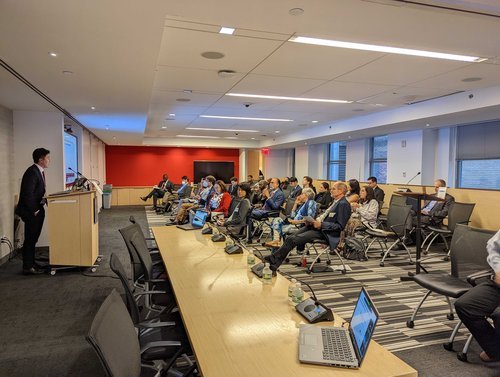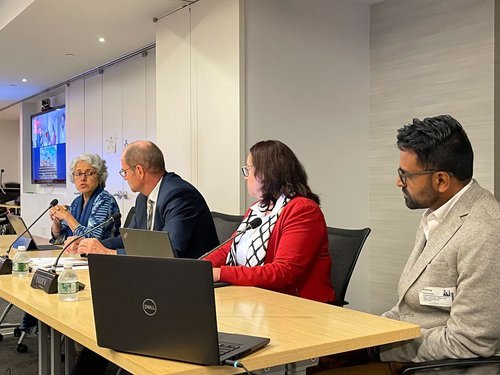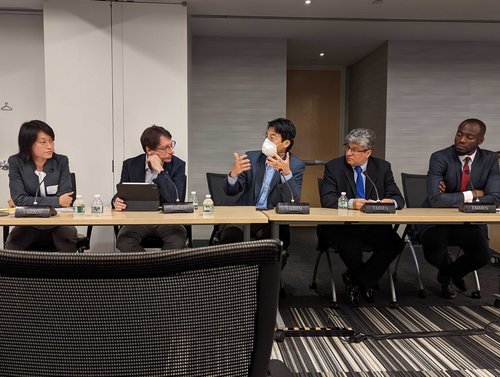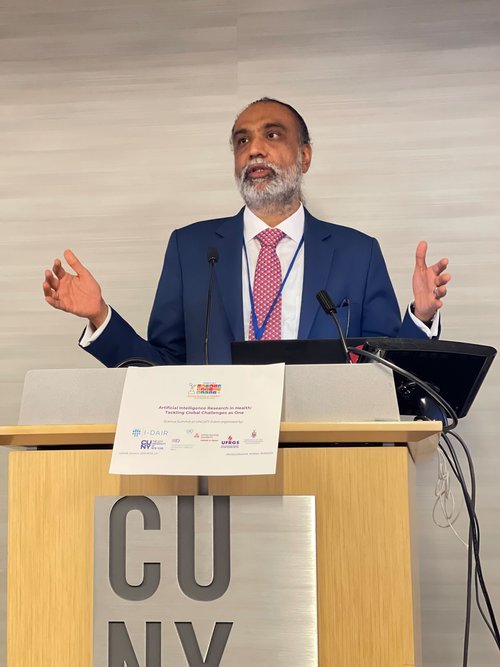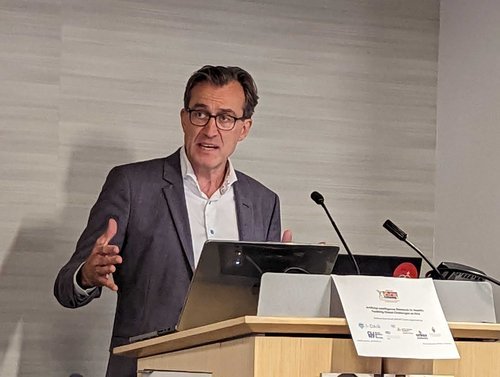I-DAIR and partners’ call for digital health public goods at the UNGA Science Summit
On 22 September, the International Digital Health and AI Research Collaborative (I-DAIR) and its global partners conducted two high-level panels at the UNGA77 Science Summit in a session entitled Artificial Intelligence Research in Health: Tackling Global Challenges as One.
Held at the City University of New York and online, the UNGA side-event addressed the growing knowledge and power imbalance in AI research and innovation for health. Panelists agreed that too few countries are leading the digital health and AI for health field, producing and benefitting from most of the knowledge, with the rest of the world risking being left behind. The discussions pointed out the need for a collective, inclusive, neutral and trusted platform to level the playing field and drive the conversation around human-rights abiding AI solutions for health.
“At the UN, we want to see a transition to data and AI commons, with a safety net for multilateral collaboration where data is used in a distributive way; and we want to congratulate I-DAIR and partners on how they are driving the conversation in this space.”
The issue of data was at the center of the debate, not only regarding the subjects of datasets quality but also questions relating to monitoring, access, sharing and ethics. Data is the missing piece of artificial intelligence technologies, said Prof. Anurag Agrawal, from Ashoka University, as he quoted a revisited version of the Ancient Mariner’s Rime: “data, data everywhere and not a drop to use”. Who holds data is a fundamental question and gaps can be highly detrimental to solving health challenges especially in low and middle-income countries (LMICs). Dr. Soumya Swaminathan of the World Health Organization (WHO) summarized the issue by highlighting the misconception that what we do not measure, does not exist - citing that for each COVID-19 case detected in Africa, 120 went undiagnosed, given the incorrect impression that the continent was particularly spared.
As emphasized by Prof. Bruce Mellado from the University of the Witwatersrand, COVID-19 became a turning point in the use of data for health. Data and artificial intelligence can provide researchers, governments and people with critical health information, especially in times of pandemic. But to be truly efficient, data needs to be monitored from different and new sources, as information and conclusions can change dramatically based on data sources - reminded Prof. Bruce Y. Lee from the CUNY Graduate School of Public Health & Health Policy.
A solution to improve the diversity and trustworthiness of data and its access is to start thinking of data as digital public goods fostered by an ecosystem where transdisciplinary scientists, public policymakers and citizens are collectively engaged. This vision requires a collaborative approach to AI research in health as well as a trusted space enabling knowledge exchange. This is why bridging disciplines, including the social sciences, and datasets together within a multistakeholder approach is essential to produce inclusive and efficient digital health policies. Serge Stinckwich from UNU Macau stressed the importance of involving more people in the design of algorithms and data models. For now, technicians from the Global North are over-represented, with little inclusion of LMICs, women, marginalized communities, and transdisciplinary experts.
“As stated by UNSG, we are gridlocked in colossal global dysfunction. We need new global institutions that embrace a new worldview. I-DAIR is at the forefront of AI in the health field and a critical contributor to creating digital public goods that are collaborative, open and inclusive.”
Thank you to all of our brilliant panelists for honoring us with their participation and sharing their insights and experiences: Dr. Christoph Benn, Director for Global Health Diplomacy at the Joep Lange Institute; USG Amandeep Singh Gill, United Nations Secretary-General’s Envoy on Technology; Prof. Anurag Agrawal, Dean of Trivedi School of Biosciences at Ashoka University; Dr. Sathy Rajasekharan, CEO of Jacaranda Health; Dr. Dominique Charron, VP of Programs and Partnerships at the IDRC; Dr. Soumya Swaminathan, Chief Scientist at WHO; Mr. Jake Okechukwu Effoduh, Chief Counsel of the ACADIC; Prof. Bruce Y. Lee, Professor of Health Policy and Management at CUNY School of Public Health; Prof. Bruce Mellado, Director of the Wits Institute; Prof. Carisi Polanczyk, Professor of Epidemiology and Cardiology at the UFRGS, Dr. Serge Stinckwich, Head of Research from UNU Macau, Dr. Peiling Yap, I-DAIR’s Chief Scientist and Dr. Stefan Germann, CEO of the Fondation Botnar.
To fully and equitably harness the power of AI for health, I-DAIR and its partners believe in a transdisciplinary, collaborative approach to research, with a focus on bringing together the voices of different LMICs stakeholders from the outset. Having a neutral, trusted space for knowledge exchange and where existing technologies are available as digital public goods can enable the global R&D agenda to manifest sustainably and bring us closer to achieving Sustainable Development Goal (SDG) 3.


